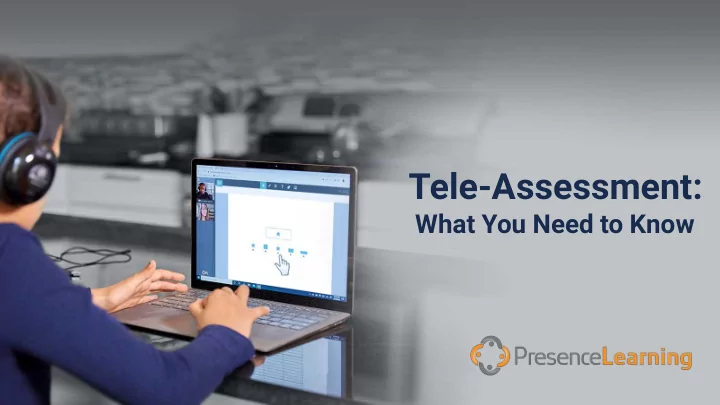

Tele-Assessment: What You Need to Know
A. Jordan Wright Nikki Johnsrud Stephanie Taylor, Kate Eberle Walker Ed.S, NCSP PhD, ABAP Program Coordinator CEO, PresenceLearning WilMac Multi-District Clinical Director, Clinical Assistant, Special Education Unit Professor of Counseling Psychoeducational Psychology Services NYU Steinhardt
Tele-assessment during school closures With extended school closures in place, schools nationwide are grappling with questions about conducting eligibility assessments. How can schools best continue serving students in need of evaluation for special ● education related services? Can needed evaluations be conducted remotely without compromising validity? ● Which assessments and circumstances are appropriate for remote administration? ●
What is tele-assessment and why would I use it? What Administering assessments remotely with a ● live person on each end Standardized tele-assessment has been in ● use for several years It has been used at brick and mortar ○ schools as well as in virtual schools in the home setting It has a research base ○ Why Creates access ● Can reallocate supply to demand ○ Give access to specialists ○
Overview of the tele-assessment landscape Schools are now looking for alternatives and JUST starting to think about this alternate modality, but it is not new It’s also not foolproof - you have to know what to consider ● It’s not a universal replacement for in-person assessment ● It CAN be done competently and with confidence when all ● factors are properly considered ● Utilization of assessments with valid research to support remote use—Not every assessment has been determined to be equivalent when conducted remotely vs in person.
What the research says about remote delivery of assessments The research is young and sparse, but ● promising Effects of altered administration are typically ● smaller than the standard error of measurement If done mindfully and carefully, results ● approximate those results of traditional, in-person assessments
Being Mindful and Careful: Important factors to consider The proctor —Guidance. It’s all about how they are ● being used Test security —Should always be minimized. Several ● techniques can help with this. Equipment —A computer with a webcam, a document ● camera, and a headset are necessary to adhere to the methods standardized by research. Environment —Evaluations as to whether the ● environment will yield valid results take place as a matter of course. Tele-assessment is no different.
Rely on your professional training Evaluations should always be built on multiple ● data sources. Assessments are one piece of that data. An examiner should always be diligent about ● observing the student’s environment during each and every task to contextualize any odd findings. Nothing can replace triangulation of data and ● professional judgment to support the validity of any assessment, in person or remote.
Key Takeaways: Guidance should reflect the full picture of information 1 available, without over generalizing or under preparing 2 There is experience to rely on and support available 3 Training should be rooted in research and best practice
Real world examples of schools utilizing in-home assessments What led to embracing tele-assessment? ● How did you consider each best practice ● guideline and overcome barriers? How are your schools incorporating ● tele-assessment into your overall services? Lessons learned you can give to others? ●
Q&A A. Jordan Wright Nikki Johnsrud Stephanie Taylor, Kate Eberle Walker Ed.S, NCSP PhD, ABAP Program Coordinator CEO, PresenceLearning WilMac Multi-District Clinical Director, Clinical Assistant, Special Education Unit Professor of Counseling Psychoeducational Psychology Services NYU Steinhardt
Resources Remote, Online Administration of Psychoeducational Assessments: A Research-Based Solution Addresses a Persistent Service Gap in Schools Nationwide , Stephanie Taylor, Ed.S, NCSP, November 2016 Equivalence of Remote, Online Administration and Traditional Face-to-Face Administration of Woodcock-Johnson IV Cognitive and Achievement Tests , Dr. A. Jordan Wright, PhD ABAP, December 2018 Clinical Best Practices for Approaching Tele-Assessment During COVID-19
Recommend
More recommend